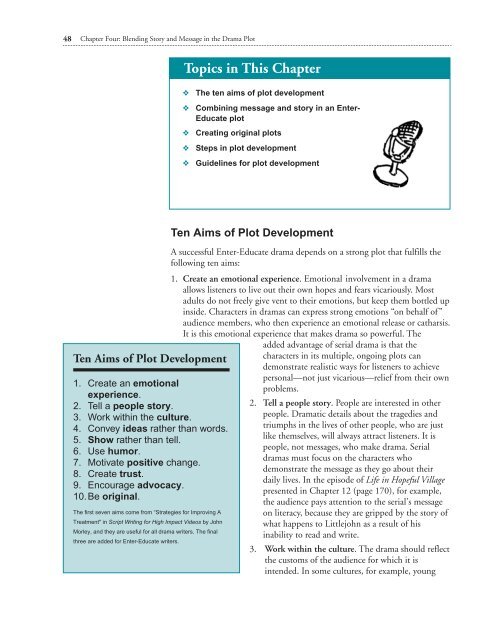How to Write a Radio Serial Drama for Social Development- PDF
How to Write a Radio Serial Drama for Social Development- PDF
How to Write a Radio Serial Drama for Social Development- PDF
Create successful ePaper yourself
Turn your PDF publications into a flip-book with our unique Google optimized e-Paper software.
48 Chapter Four: Blending S<strong>to</strong>ry and Message in the <strong>Drama</strong> Plot<br />
Topics in This Chapter<br />
❖<br />
❖<br />
❖<br />
❖<br />
❖<br />
The ten aims of plot development<br />
Combining message and s<strong>to</strong>ry in an Enter-<br />
Educate plot<br />
Creating original plots<br />
Steps in plot development<br />
Guidelines <strong>for</strong> plot development<br />
Ten Aims of Plot <strong>Development</strong><br />
1. Create an emotional<br />
experience.<br />
2. Tell a people s<strong>to</strong>ry.<br />
3. Work within the culture.<br />
4. Convey ideas rather than words.<br />
5. Show rather than tell.<br />
6. Use humor.<br />
7. Motivate positive change.<br />
8. Create trust.<br />
9. Encourage advocacy.<br />
10.Be original.<br />
The first seven aims come from “Strategies <strong>for</strong> Improving A<br />
Treatment" in Script Writing <strong>for</strong> High Impact Videos by John<br />
Morley, and they are useful <strong>for</strong> all drama writers. The final<br />
three are added <strong>for</strong> Enter-Educate writers.<br />
Ten Aims of Plot <strong>Development</strong><br />
A successful Enter-Educate drama depends on a strong plot that fulfills the<br />
following ten aims:<br />
1. Create an emotional experience. Emotional involvement in a drama<br />
allows listeners <strong>to</strong> live out their own hopes and fears vicariously. Most<br />
adults do not freely give vent <strong>to</strong> their emotions, but keep them bottled up<br />
inside. Characters in dramas can express strong emotions “on behalf of”<br />
audience members, who then experience an emotional release or catharsis.<br />
It is this emotional experience that makes drama so powerful. The<br />
added advantage of serial drama is that the<br />
characters in its multiple, ongoing plots can<br />
demonstrate realistic ways <strong>for</strong> listeners <strong>to</strong> achieve<br />
personal—not just vicarious—relief from their own<br />
problems.<br />
2. Tell a people s<strong>to</strong>ry. People are interested in other<br />
people. <strong>Drama</strong>tic details about the tragedies and<br />
triumphs in the lives of other people, who are just<br />
like themselves, will always attract listeners. It is<br />
people, not messages, who make drama. <strong>Serial</strong><br />
dramas must focus on the characters who<br />
demonstrate the message as they go about their<br />
daily lives. In the episode of Life in Hopeful Village<br />
presented in Chapter 12 (page 170), <strong>for</strong> example,<br />
the audience pays attention <strong>to</strong> the serial's message<br />
on literacy, because they are gripped by the s<strong>to</strong>ry of<br />
what happens <strong>to</strong> Littlejohn as a result of his<br />
inability <strong>to</strong> read and write.<br />
3. Work within the culture. The drama should reflect<br />
the cus<strong>to</strong>ms of the audience <strong>for</strong> which it is<br />
intended. In some cultures, <strong>for</strong> example, young
















